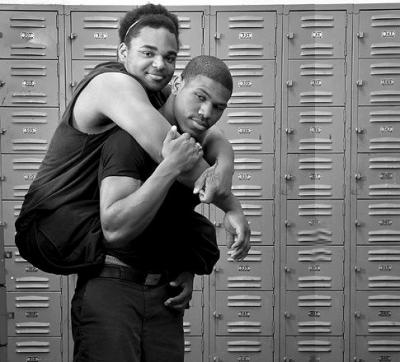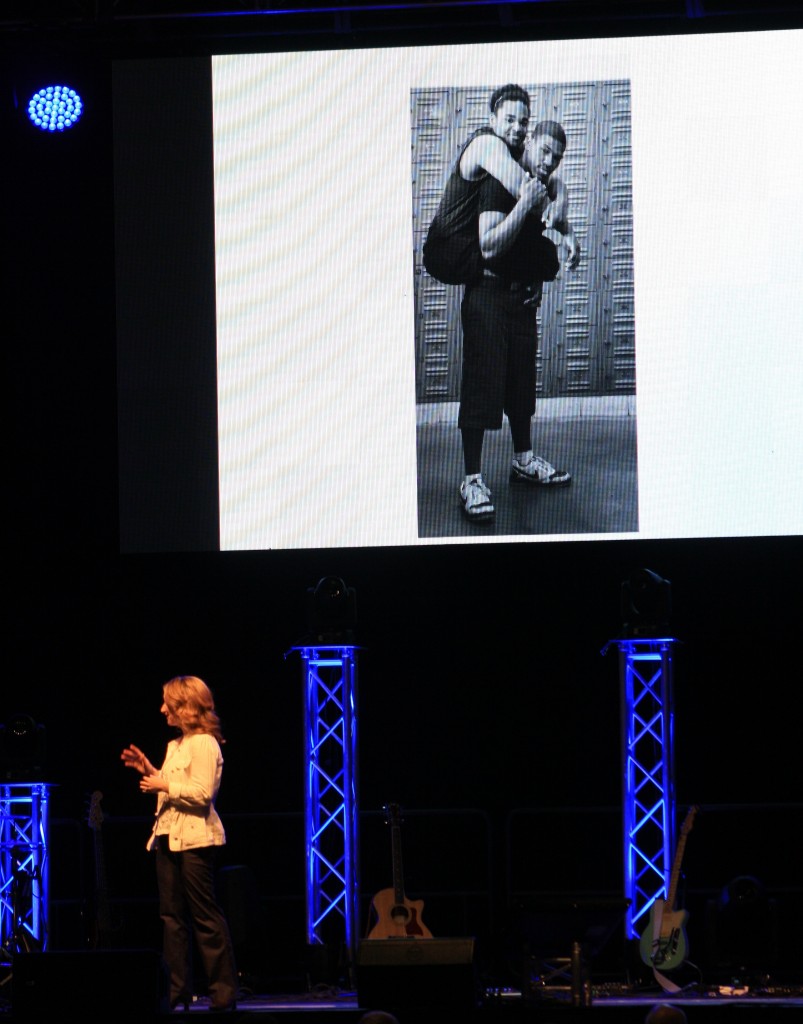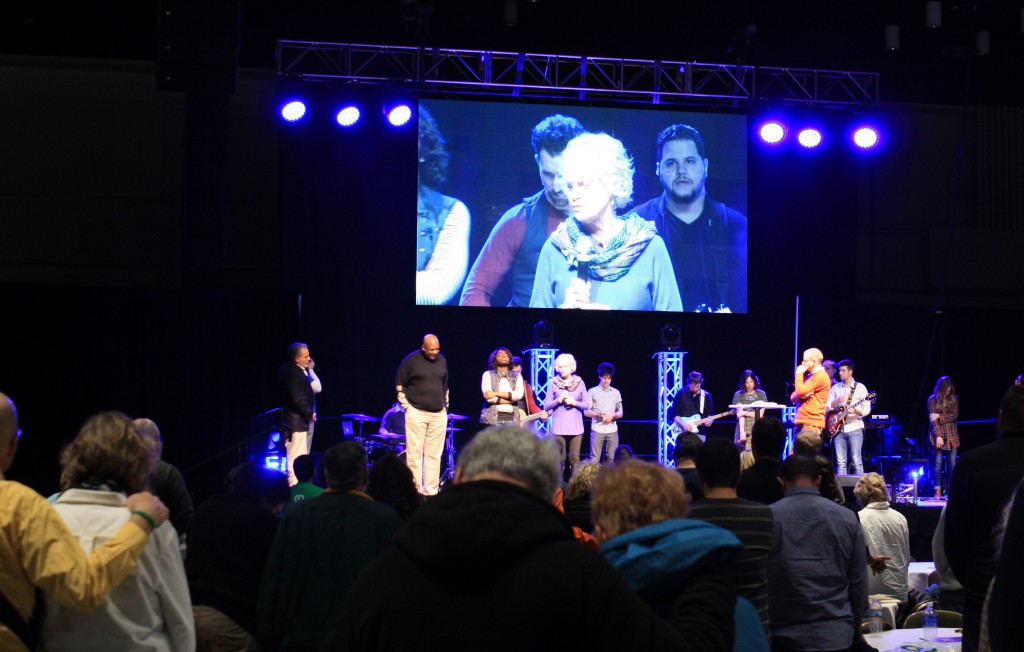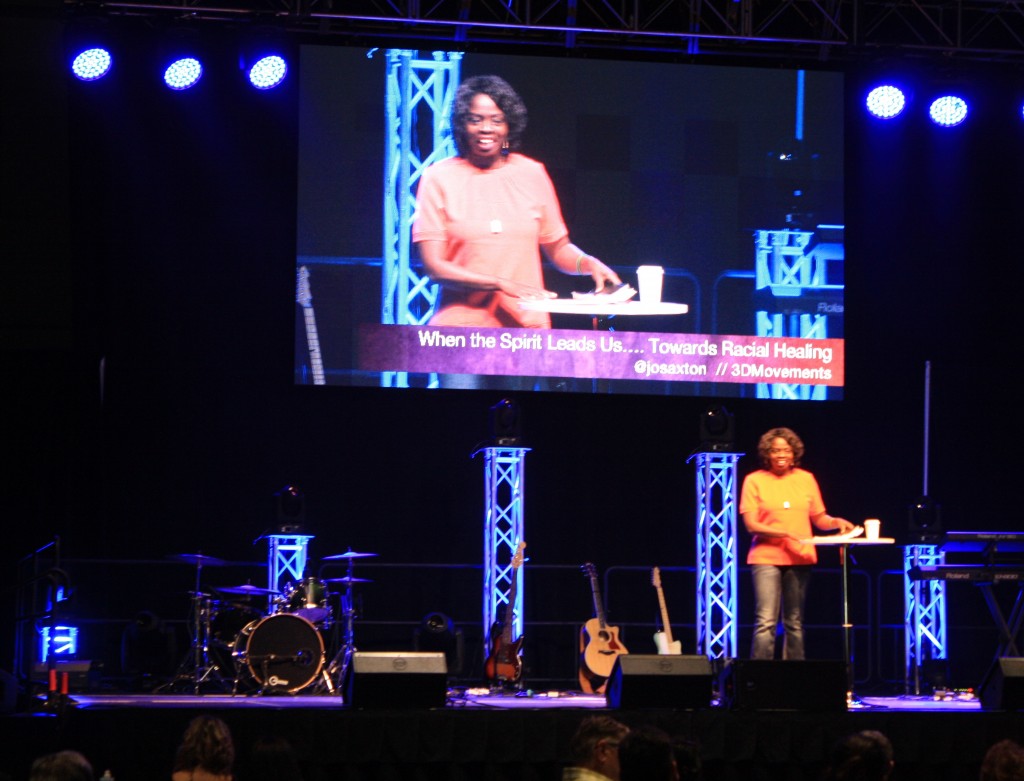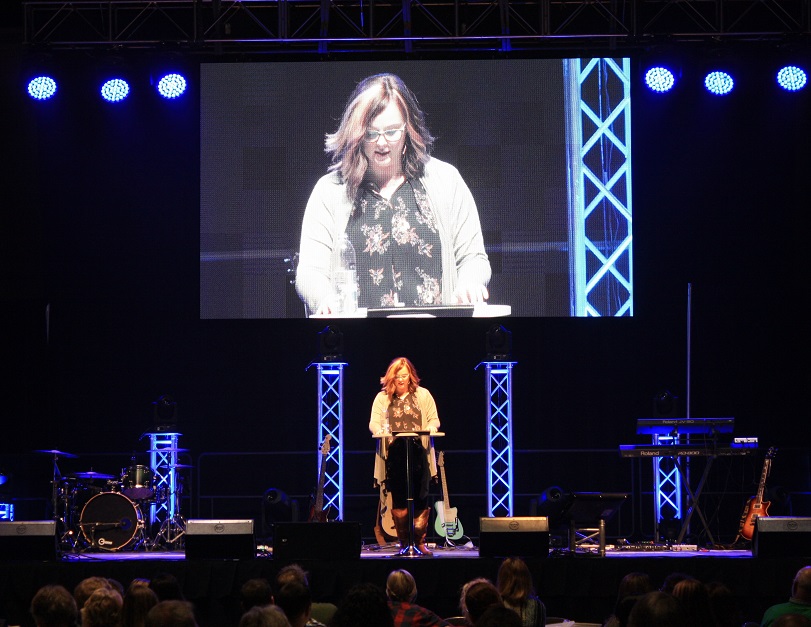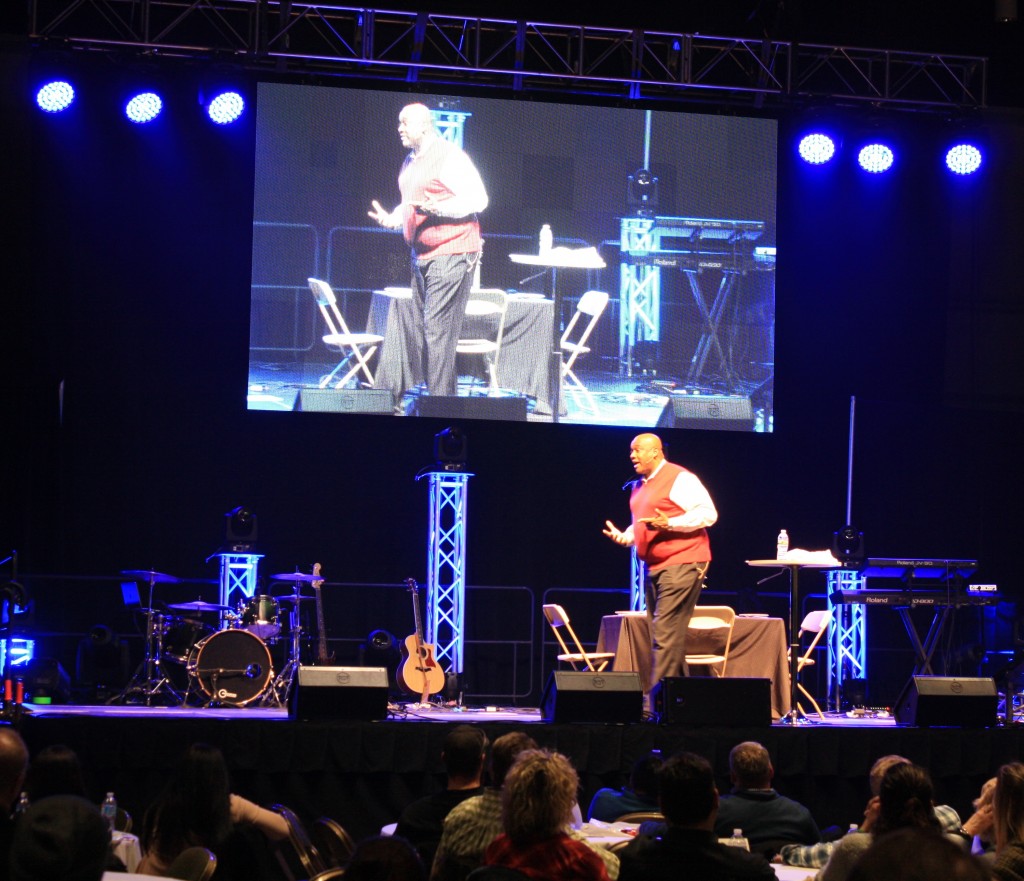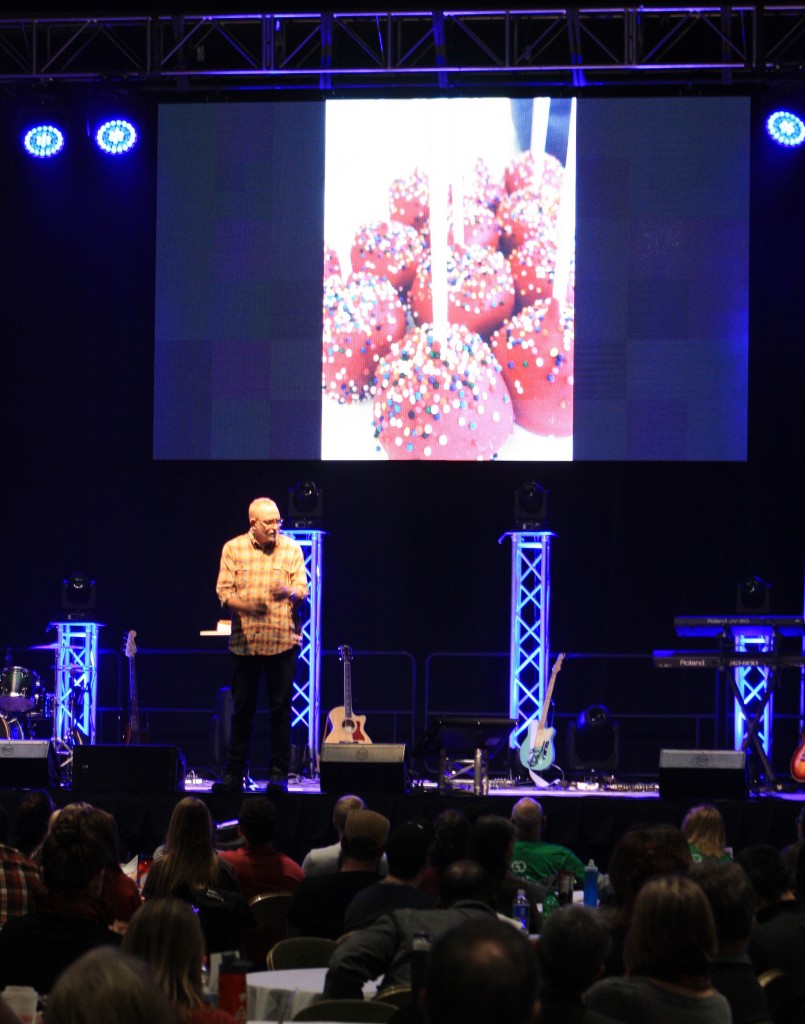By Kimberley Edgar
WORCESTER, Mass. – It wasn’t the first time her well-meaning dad, an avid sports enthusiast, had been on the lookout for the next big story for his daughter to handle.
As he read an article about two inner-city high-school wrestlers over the phone to her from the Cleveland (Ohio) Plain Dealer’s morning newspaper, Lisa Fenn found an online version of the story on her laptop and saw the picture of the two teens.
There was something about the photo that grabbed and gripped her attention like none other. The photo that had drawn her father’s attention would do more than captivate Lisa’s focus – it would capture and change her life, the lives of those two poor, parentless boys and others around them.
The award-winning ESPN sports producer could not shake the image of the legless Leroy Sutton straddling the back of Dartanyon Crockett, his arms wrapped around the neck of his legally blind friend in piggyback position. The seniors were to play in a match that very night, the last of their high-school careers.
She drove to work in Bristol, Conn., that blustery Feb. 19, 2009 morning with unrelenting resolve and pitched the story idea to her boss. It wasn’t an easy sell, but within hours she was on board a Hartford-to-Cleveland flight and met with the athletes that same day.
“All you need to know is you’ve been sent here by God today,” their coach greeted her and the camera crew that had arrived the same time she had after a five-hour drive from Cincinnati.
But Lisa had no idea she was about to step from the comfortable shadows of obscurity in her work as a producer and onto the stage of the teens’ lives and into the spotlight as their – as Dartanyon would later write on more than one application requiring an emergency contact – “Guardian Angel.”
Fast forward to Feb. 18, 2017, almost eight years to the day Lisa first got her father’s early-morning call. Lisa was again in the spotlight, this time telling those attending Vision New England’s two-day Go! Conference at the DCU Center how a “severely introverted anonymous television producer” had come to a position such as this. She shared how God interwove Dartanyon’s and Leroy’s story with hers beyond her role as journalist to minister of His love, grace and mercy to them and help them overcome.
“I laid awake many a night wondering if we were in over our heads,” said Lisa, who herself had prayed for God to show her where He was working and how He could use her there. “I didn’t understand how they could miss the opportunities being offered them. But opportunities were only half of the equation. The other half was love. When things grew difficult, I loved them harder.”
The audience sat riveted, most faces streaked with tears by the end of the presentation, which included a 21:13 minute video and followed Restore International Founder Bob Goff’s talk on Love Mercy, one of the conference themes. This was why so many had attended – to gain a picture of how God’s love might take form in the 21st Century as they live and walk out Micah 6:8: Do justice, love mercy, walk humbly – and fulfill the Great Commission, to make disciples.
Now, as the themes of the conference mingled and merged together in her presentation, this was more than a picture of love. There was a charge and challenge for each individual in the audience from the Almighty Himself.
The crowd rose in a standing ovation to Lisa before Ruth Graham, another speaker, came to the stage to pray.
“I don’t know about you, but my heart is full,” the daughter of the famed evangelist said. “Let’s quiet ourselves, quiet our hearts and minds, close your eyes, take a deep breath and let it out. I want you to talk to the Almighty God, the Ancient of Days, the Creator of the Universe, but also your Daddy.
“I want you to thank Him, praise Him for Who He is,” said Ruth, who had addressed the group the previous day, also on the Love Mercy theme. “He is the Almighty. He is so big, so full of compassion. Just praise Him for Who He is. “Now, I want you to thank Him for Lisa – and the story she told, for Bob and how he challenged us. Thank Him for the very breath you take and the air that you breathe – just thank Him,” she said. “Maybe you would like to ask for His forgiveness: ‘Father, I’ve turned away opportunity. I’ve squandered opportunities. Please forgive me.’
“Ask Him to fill you with Himself,” she said.
“Just breathe in Jesus, and let go of all the other stuff. Ask Him for His vision for ‘my’ life – to make it plain, and please don’t let ‘me’ be distracted by other people’s visions for their lives or for ‘my’ life. “What has He asked you to do?” she asked. “Simply say, ‘Yes. Yes, LORD.’ Certainly, we have no excuses after what we’ve seen this morning.”
The previous morning, on Feb. 17, the Rev. Neil Hudson and Jo Saxton had kicked off things with their talks. Neil is Imagine Project Director for the London Institute for Contemporary Christianity, an organization founded by John Stott to help Christians integrate their faith and everyday life.
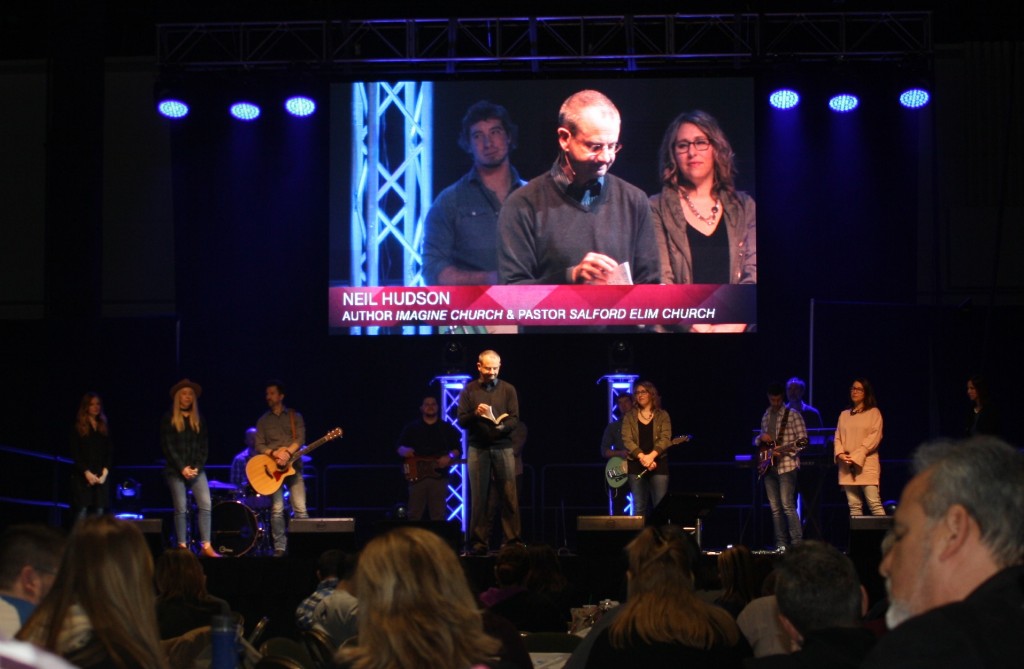
Rev. Neil Hudson is the Imagine Project Director for the London Institute for Contemporary Christianity
With a background heavily steeped in establishing whole-life discipleship cultures in congregations in Great Britain and the United States, he was well-suited to open and close the conference discourse on Make Disciples. He helped paint a more holistic approach to disciple-making than that which is typically seen in churches, where so many break evangelism and discipleship into two separate areas and initiatives.
“This is the imperative of Jesus: Make disciples,” Go! Conference literature states. “And it’s both a personal and corporate commission. All of us are called as individuals to be a witness of God’s grace and mercy in our lives to the world around us. Our churches also ought to be effective witnessing communities to their cities.”
Born to Nigerian parents and raised in London, Jo Saxton has spent 20 years spreading her message of missional living and discipleship across the United Kingdom and North America while pastoring and planting several churches on both sides of the Atlantic. She also encourages and equips women for leadership and influence.
In her book, “More than Enchanting: Breaking Through Barriers to Influence Your World,” Jo discusses the central role of women in the church and how to handle the juxtaposition of the biblical model and the reality of marginalization that most women find in their churches, neighborhoods, cities and society.
Marginalization of women in the Church also surfaced during Sarah Bessey’s plenary talk. She, like Jo, was invited to speak on Do Justice at this year’s conference, with a mandate to target and explore justice issues with gender and race and challenge Christians to remove injustices that so often prevail and hinder family and friends from and in their relationships with Christ.
After her first book, “Jesus Feminist: An Invitation to Revisit the Bible’s View of Women,” her husband and sister organized a surprise book-release party for her and invited her parents, pastor, family and friends. One of the many photos taken and posted online gathered more than 1,000 comments.
In the picture, Sarah was surrounded by her husband, father and pastor as they laid hands on and prayed over her.
The comments all seemed to say: “My dad … husband … pastor … would never do that. They might grudgingly tolerate me in ministry, but they would never pray for me like that,” Sarah said.
“The Church has something good and important to say about women,” she told the conference attendees. “The No. 1 place where women should feel equipped to follow the call of God is in the Church.” Instead, she said, women have been labeled negatively as:
- Insecure people;
- Manipulators;
- Gossips;
- Poor leaders but bossy individuals;
- Easily deceived people;
- Gender valued only based on appearance and should not be too big or too small;
- Gender valued only for being married and mothers;
- Terrible friends;
- Players of mind games;
- High maintenance individuals.
“Simultaneously, the message has been: ‘You are either too much or not enough,’” Sarah said.
Retired NFL Player and Pastor Rickey Bolden closed the first day, discussing another of the conference themes, Walk Humbly. He opened his comments by congratulating the New England Patriots fans, but adding that he could identify with the Atlanta Falcons from his days playing for the Cleveland Browns, in the mid-1980s. During that time, his team went to three AFC championships to lead in all three games only to lose in the last two minutes of the game – a lesson in humility in the game of life.
He quickly shifted his comments to tackle the conference theme. “The issue is not humility,” he said. “The issue is Jesus. You cannot have humility without Jesus.” Many “Amens” sounded throughout his talk after he touched a collective funny bone in the audience and elicited their laughter when he shared some light humor, saying he had noticed some “amen constipation” with earlier messages and wanted to encourage the crowd to loosen up.
Rickey took the group on a tour of Luke 14:7-11 after quickly reviewing the context of the previous chapters, beginning in Luke 1 and taking them through the birth, baptism, commissioning and ministry of Jesus. By Luke 9:51, Jesus was on His way to the Cross, Rickey said. “This is serious,” he said. “Luke is giving Jesus His last will and testament.” Rickey took people to the table where Jesus was sitting one Sabbath in the house of a Pharisee, as depicted in Luke 14:
14 One Sabbath, when Jesus went to eat in the house of a prominent Pharisee, he was being carefully watched. 2 There in front of him was a man suffering from abnormal swelling of his body. 3 Jesus asked the Pharisees and experts in the law, “Is it lawful to heal on the Sabbath or not?” 4 But they remained silent. So taking hold of the man, he healed him and sent him on his way.
5 Then he asked them, “If one of you has a child[a] or an ox that falls into a well on the Sabbath day, will you not immediately pull it out?” 6 And they had nothing to say.
7 When he noticed how the guests picked the places of honor at the table, he told them this parable: 8 “When someone invites you to a wedding feast, do not take the place of honor, for a person more distinguished than you may have been invited. 9 If so, the host who invited both of you will come and say to you, ‘Give this person your seat.’ Then, humiliated, you will have to take the least important place. 10 But when you are invited, take the lowest place, so that when your host comes, he will say to you, ‘Friend, move up to a better place.’ Then you will be honored in the presence of all the other guests. 11 For all those who exalt themselves will be humbled, and those who humble themselves will be exalted.”
12 Then Jesus said to his host, “When you give a luncheon or dinner, do not invite your friends, your brothers or sisters, your relatives, or your rich neighbors; if you do, they may invite you back and so you will be repaid. 13 But when you give a banquet, invite the poor, the crippled, the lame, the blind, 14 and you will be blessed. Although they cannot repay you, you will be repaid at the resurrection of the righteous.”
Among the truths he observed:
- We are to position ourselves in places where we are pouring the love of the Father into the poor, disadvantaged and oppressed, just as Jesus did when He healed the man with dropsy;
- A person walking in humility must prioritize relationship over resume – Jesus called the person who had been doing everything to develop the relationship with the host, “Friend,” Rickey noted, and
- The person walking in humility will respond to the host’s invitation to move closer to him.
“He invites you to move closer to Him,” Rickey said, and referenced John 15:5 (“I am the vine; you are the branches. If a man remains in Me and I in him, he will bear much fruit; apart from Me you can do nothing.”
“If you want to be more effective in what you are doing, you need to move closer,” he said.
There was a similar ring to Bob Goff’s message opening the Saturday sessions. “If you want to see more in your life, don’t make it about you,” he said.
Bob is an attorney who not only runs the human-rights Restore International, operating in Uganda, India and Somalia but also is the New York Times best-selling author of “Love Does.”
He has pioneered the vision of Restore International to fight for freedom and human rights and work to improve educational opportunities and be helpful to those in need of a voice and a friend. Restore has worked with Uganda’s judiciary in bringing more than 200 cases to trial and pursue justice, intervention and education for at-risk women and children in Uganda, India and Somalia.
“Nothing scares a terrorist more than a girl with a book,” he said and told how dangerous the work can be but how it has to be done. Instead of being afraid, he encouraged people to be doers of the Word, trust Jesus and people who keep their word.
“Don’t worry about what you’re going to bring when you get there – just get there!” he said and shared how once he was walking along the streets of Mogadishu, where armed men seem to be as much a part of the scenery as the sky.
He had nothing on him but a cell phone that day when one of these armed men came up to him. In a second, he put it up and turned it toward his face and asked, “Do you know what a selfie is?” “So, he didn’t shoot,” Bob said.
He also shared the importance of keeping one’s word to share the Gospel of love with others. One time, he was invited to work with some men at a church but confused the time, showing up early in the morning to flip pancakes when he was supposed to speak to a group of men 12 hours later, that night.
He had a speaking engagement the next morning at a college commencement miles away in Los Angeles and couldn’t get a flight out that night. But he called Uber and lined up a ride for that night after he addressed the men.
So he stayed. He was doing his word.
After one hour speaking with the Uber driver and hearing his life story and how tired he was, he told the driver to pull over, and he drove the rest of the way to Los Angeles. He was doing his word.
After a $950 tab was paid, he went to the commencement, gave his address and was longing to get to a bed and get some sleep when the president asked, “Bob, would you like to go see a women’s softball game?” He really didn’t because all he wanted to do was sleep. But he went anyway. He was doing his word.
And the LORD also blessed him in witnessing an amazing act of mercy when one of the players injured herself while running the bases, and the other team responded by carrying her around so she could record her run. “Let us see more of You in simple ways, and keep us from making the Gospel difficult,” he prayed in closing his remarks.
The Go! Conference was well attended and judging by the smiles on everyone’s face I’m sure many will return for Go! Conference 2018 which will be held in Springfield, MA.
For additional information please visit www.goconf.org


